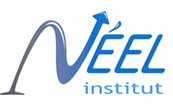- Home
- Institut Néel
- Research teams
- Technical Groups & Services
- Work at the Institut
- Partnerships
The new states arise from the competition between different degrees of freedom (charge, spin, orbital moment, lattice) leading to instabilities and provoking apparition of quantum phenomena (magnetism, charge and spin density waves, superconductivity to name the most prominent) By means of theory and experiment we aim to understand the microscopic origin of these states and to shed light on the their roots, strong electron electron interaction, low dimensionality, frustration, spin orbit coupling, disorder. Studies at very low temperatures, one of the renowned expertise of the laboratory, play a pivotal rôle in our research.
Besides solid phases of matter we study dens phases of 3He and 4He, the isotopes of helium, form ultralow temperatures (less than 1/1000 of à degree above absolute zero temperature) up to tens of degrees, as a model system for exploring a wide range of open questions in Physics, from magnetism to turbulence. Joining expertise in nanoscience and low temperatures allows to detect the signature of a single structural defect to reach the quantum limit of mechanical degrees of freedom.
The conjunction of expertise between scientists and engineers allows us to develop new technological approaches and unique instruments destined for electrical engineering employing high temperature superconductors, astrophysics, observational cosmology and the interface between biology and physics.
Via an innovative instrumentation approach based on three technical services, MCBT department has developed unique experimental instruments for measurements down to low temperatures: thermodynamic and transport measurements, magnetic microscopy, innovative refrigerators and cryogenic detectors, NMR and microwave spectrum, low-temperature optical… These competences are behind industrial applications (patents, licenses, contracts) divided through the following topics
• Developments of innovative cryogenic;
• Applications of superconductivity;
• Low electronic noise and temperature control;
• Nanocalorimetric sensor and Associated Instrumentation;
• Techniques of crystal growth;
• These actions with industry follow the development of new technologies through licenses, technical know-how on software and embedded electronics.
The department is involved in many training actions. Beyond the contribution of assistants and full professors and the welcoming of trainees or PhD, practical works are organized by the department (Cesire PW fo bachelor, cryogenics PW for masters). It’s also involved in permanent training of CNRS in cryogenics.
The department is involved in organization of European cryophysics and cryogenic school Cryocourse in Grenoble , and co-organise whith the two other department the European school on magnetism (ESM).
